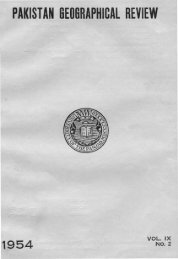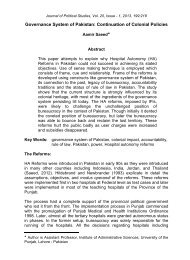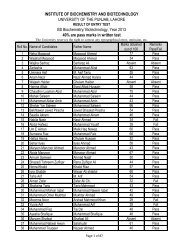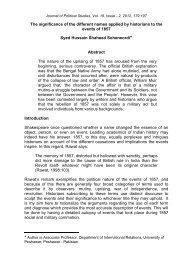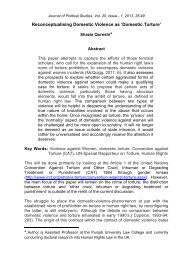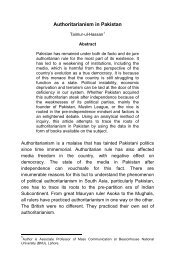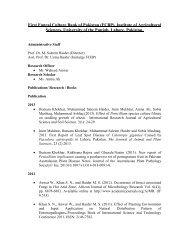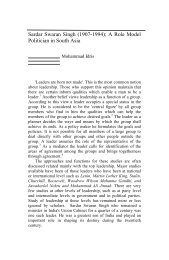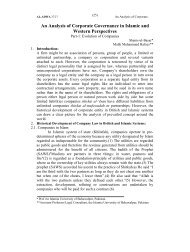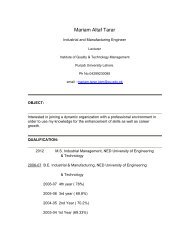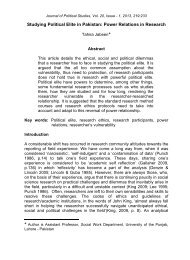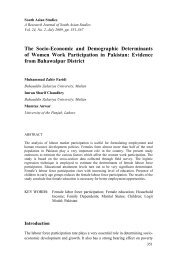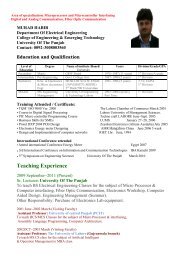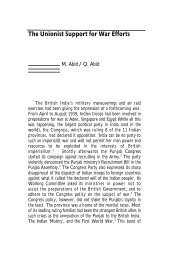Can Pakistan be a Secular State? - University of the Punjab
Can Pakistan be a Secular State? - University of the Punjab
Can Pakistan be a Secular State? - University of the Punjab
You also want an ePaper? Increase the reach of your titles
YUMPU automatically turns print PDFs into web optimized ePapers that Google loves.
South Asian Studies 28 (1)<br />
answer and viable solution? Does it not need total revisiting <strong>the</strong> society and<br />
bringing a revolution <strong>of</strong> thinking at <strong>the</strong> top and socio-economic change at <strong>the</strong> grass<br />
root level?<br />
Theological Aspect<br />
Islam is religion <strong>of</strong> 97% people <strong>of</strong> <strong>Pakistan</strong>. Islam is a monolithic religion.<br />
Muhammad (peace <strong>be</strong> upon him) was a human <strong>be</strong>ing 12 and was not <strong>the</strong> part <strong>of</strong> God<br />
like Jesus <strong>be</strong>ing part <strong>of</strong> <strong>the</strong> Trinity. He was not divine. Rightly guided Caliphs,<br />
from Abu Bakr to Ali were successors <strong>of</strong> Muhammad (pbuh) in <strong>the</strong> socio-political<br />
sense. They were not infallible and did not exercise <strong>the</strong> authority to hear<br />
confession and grant expiation to people from <strong>the</strong>ir sins. There is no papacy in<br />
Islam. Divine authority is not a shared phenomenon in Islam like in <strong>the</strong><br />
Christianity. Naquib Al-Attas narrating <strong>the</strong> nature <strong>of</strong> authority in Islam states,<br />
“Islam indeed desacrilized politics, but not to <strong>the</strong> extent <strong>the</strong>y mean, for Islam itself<br />
is based on Divine Authority and on <strong>the</strong> sacred authority <strong>of</strong> <strong>the</strong> Holy Prophet (may<br />
God bless and give him Peace), which is no less than <strong>the</strong> reflection <strong>of</strong> God’s<br />
Authority, and on <strong>the</strong> authority <strong>of</strong> those who emulate his example. Thus every<br />
Muslim individually, and collectively as a society and nation as a Community<br />
(ummah) all deny to anyone, to any government and state, sacral legitimacy unless<br />
<strong>the</strong> person or <strong>the</strong> government or <strong>the</strong> state conforms with <strong>the</strong> practice <strong>of</strong> <strong>the</strong> Holy<br />
Prophet (may God bless and give him Peace) and follow <strong>the</strong> injunctions <strong>of</strong> <strong>the</strong><br />
Sacred Law revealed by God. Indeed, <strong>the</strong> Muslim in fact does not owe real<br />
allegiance and loyalty even to legitimate king and country and state; his real<br />
allegiance and fealty and loyalty is to God and to His Prophet to <strong>the</strong> exclusion <strong>of</strong><br />
all else” (Attas N. 1993: 32). The history <strong>of</strong> Islam has no chapter <strong>of</strong> Protestantism.<br />
Resultantly <strong>the</strong>re is no secularism in Islam. There is no division <strong>of</strong> religion and<br />
state in din al-Islam (Ibid). Islam is ideally always relevant in every sphere <strong>of</strong> <strong>the</strong><br />
follower’s life. Islam is a complete code <strong>of</strong> life and its ubiquity is reflected in <strong>the</strong><br />
model Madinian state established by <strong>the</strong> Prophet <strong>of</strong> Islam and carried out by<br />
earlier four Caliphs till 661AD. The Quran and traditions <strong>of</strong> <strong>the</strong> Prophet are <strong>the</strong><br />
primary criteria for seeking guidance in all <strong>the</strong> affairs <strong>of</strong> life for every Muslim.<br />
Earlier jurists <strong>of</strong> Islam i.e., Malik, Ja’afar, Ibn Hanbal, Abu Hanifa and Shafa’i, by<br />
interpreting <strong>the</strong> teachings <strong>of</strong> <strong>the</strong> Quran and <strong>the</strong> Traditions have provided a viable<br />
blueprint - Fiqh and Shariah - for Muslims to act upon and <strong>be</strong>ar a religious life. It<br />
does not mean that Islam is only what was perceived and interpreted twelve to ten<br />
centuries earlier. Scholars <strong>of</strong> Islam are obliged to do Ijtihad 13 keeping Islam a<br />
universal religion viable <strong>be</strong>yond time and space. Ijtihad is a continuing practice; a<br />
qualified <strong>be</strong>liever can do it for <strong>the</strong> welfare <strong>of</strong> <strong>the</strong> whole community <strong>of</strong> <strong>the</strong><br />
<strong>be</strong>lievers. It has <strong>be</strong>en enjoined on Muslim scholars by <strong>the</strong> Prophet to resolve<br />
everyday problems <strong>of</strong> Muslims by doing a sincere effort <strong>of</strong> Ijtihad. A scholar/jurist<br />
arriving at a wrong conclusion is even rewarded 14 . There can <strong>be</strong> difference <strong>of</strong><br />
opinion <strong>of</strong> different Muslim scholars on a specific matter but <strong>the</strong> verdict <strong>of</strong><br />
180



